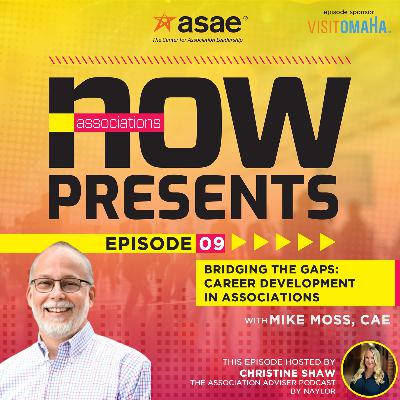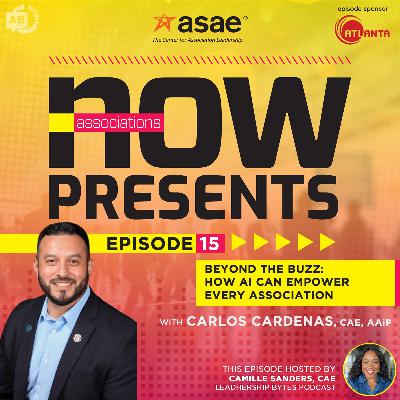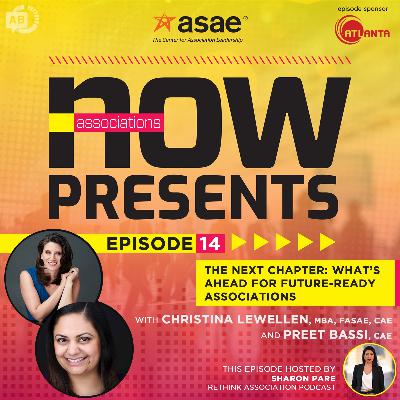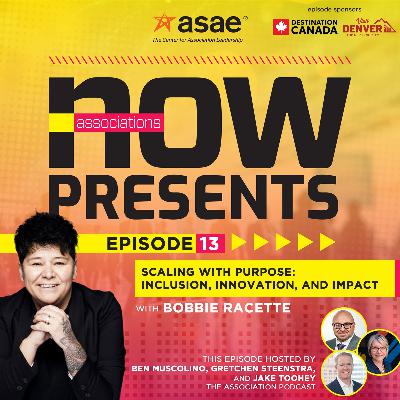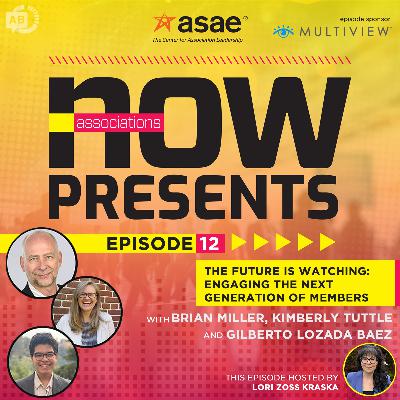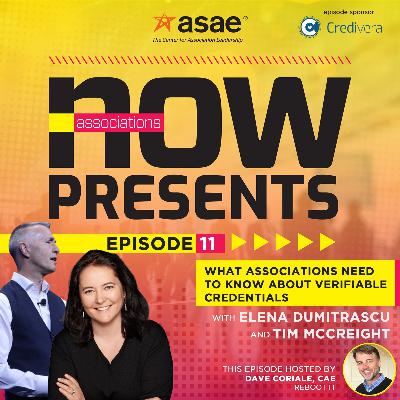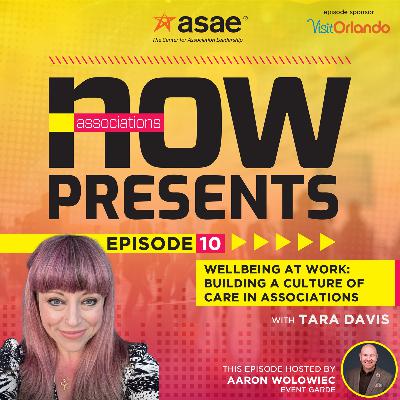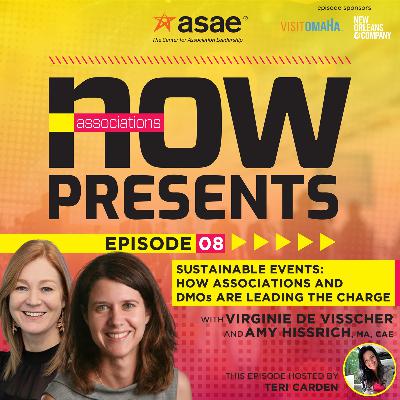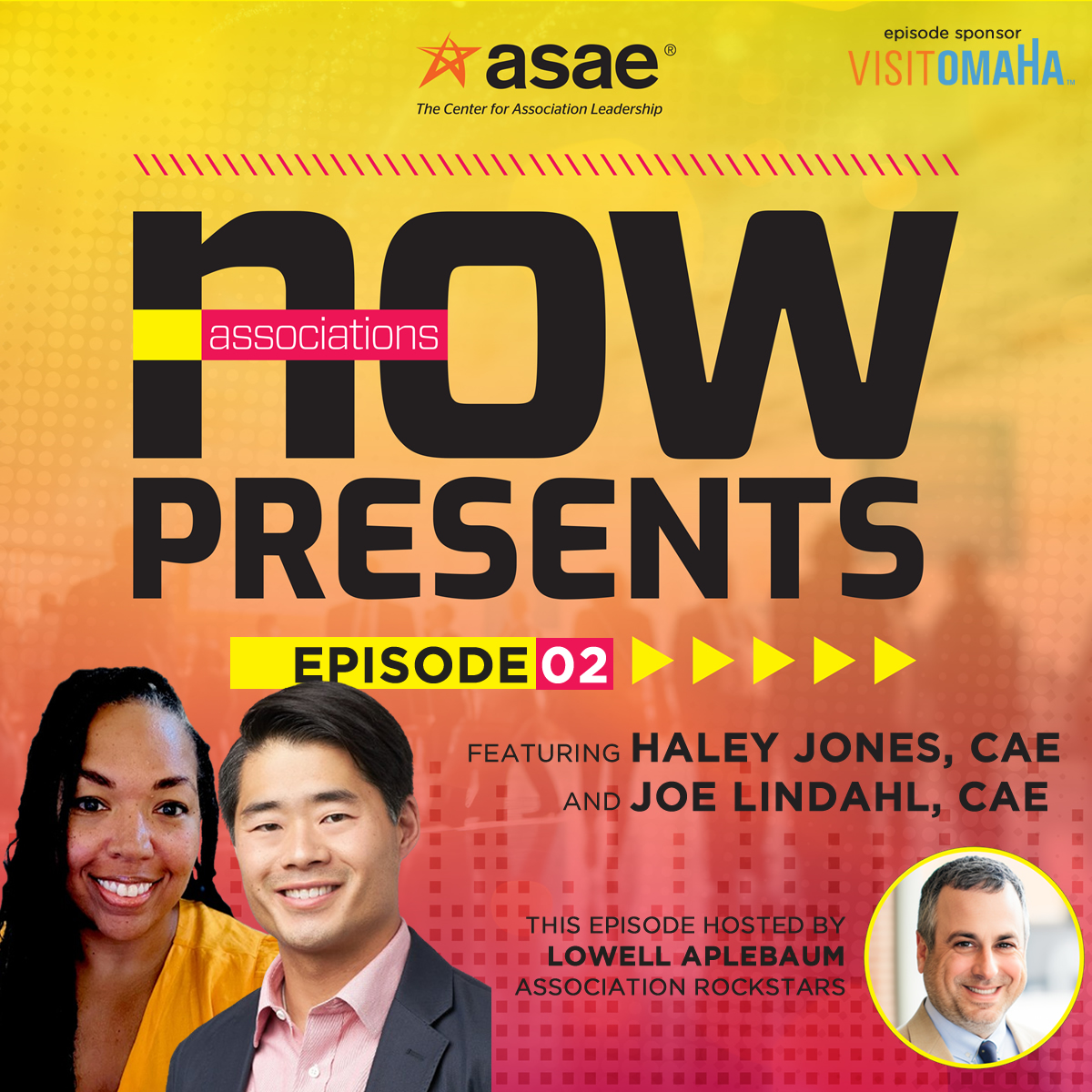Bridging the Gaps: Career Development in Associations
Description
In this episode of Associations NOW Presents, guest host Christine Shaw of The Association Adviser Podcast sits down with Mike Moss, CAE, president of the Society for College and University Planning, for an insightful conversation on the shifting dynamics of career development in the association space. They explore the growing demand for purpose-driven work, the realities of hybrid and remote models, and how associations can foster meaningful engagement in a digital world. Mike shares strategies for building intentional connections, promoting continuous learning, and creating psychologically safe workplaces. The discussion also touches on transparent hiring, value-based leadership, and how associations can remain agile by rethinking professional development and evolving their strategic plans to meet today’s challenges.
Check out the video podcast here:
This episode is sponsored by Visit Omaha and New Orleans & Company.
Associations NOW Presents is produced by Association Briefings.
Transcript
Christine Shaw: [00:00:00 ] Welcome to episode nine of Associations NOW Presents, an original podcast series from the American Society of Association Executives. I'm Christine Shaw, CEO of Naylor Association Solutions. You probably heard me on my podcast, the Association Advisor. However, today I'm honored to host this episode for the ASAE.
Before we begin, I'd like to take a moment to thank our episode sponsor, visit Omaha. For today's episode, we're excited to talk to Mike Moss, president of the Society for College and University, planning about the evolving landscape of career development within the association space, and what professionals can expect in the year ahead.
Welcome to the show, Mike.
Mike Moss, CAE: Thank you very much for having me and looking forward to our conversation.
Christine Shaw: Fantastic. Well, let's just dig right in and start with the big picture. How is career development evolving in the association world and what makes this moment particularly pivotal?
Mike Moss, CAE: Yeah, and it's the right [00:01:00 ] question to start with because I think from our perspective at SC and also mine as a 34 year practitioner in the space is we're shifting from a linear to a kind of a multi-directional career path.
As I came up through the industry, it was a pretty logical progression for me in operations between being an assistant to a manager, to a director, but pretty much all within the same discipline as I was given opportunities, maybe different associations. I. The directional was pretty linear, and what I really appreciate where we're going as an industry now is that we do have multiple directional paths, meaning I can do a bunch of different things at my association or require a bunch of different skill sets over time, and the association can be committed to me to develop those skills.
I do not have to come on entry with. All the skill sets to be a generalist. I can come in with specific skill sets, develop competencies in certain areas, and then have another opportunity to explore different career paths. And I do think what that's been driven by, and you'll hear me talk about this a lot, probably today, which is I do think our employment base is [00:02:00 ] beautifully shifting to being purpose driven.
And that's why they're attracted to our sector is they're here to serve and they realize that the service is going to change as tech changes needs change, service requirements change, funding change. I. And I think that this next batch of association employees really get the purpose-driven association.
Christine Shaw: Mike, I agree with you on the purpose driven. That's one of the reasons too. A lot of people, myself included, are drawn to this space. I liked what you said though, that you don't necessarily have to have all the skills 'cause they'll be developed. And I think sometimes people hold themselves back because they think they need to have all the skills.
So that's very encouraging coming from someone like you who's reached to the top position and letting people know that we're here to develop your career along the way. Let's talk about a tricky subject now, right. Nothing's gotten more attention than remote and hybrid work. They've become very common across many industries.
So talk to me about how associations are adapting to this shift and what challenges or opportunities does it present for talent [00:03:00 ] development?
Mike Moss, CAE: Yeah, and I, what I'll do here intentionally is avoid the generational trap. I know this is a pod, so people not, may not be able to see me, but after working for 34 years, you can imagine I'm not in my twenties.
I came up in a different type of environment than what we're offering now. The hybrid remote, and my organization is hybrid remote, meaning everybody in the central office location of Ann Arbor is hybrid. We also have employees coast to coast. So we have a beautiful mix and I think some of the challenges that we've experienced that may probably translate to other listeners is that there has to be a real intentional connection process.
You can't just assume people are checking in with one another just to check on the weekend. All that proverbial water cooler talk can be very challenging. And I think we've really experimented with different types of setups. And the one that's worked the best for us is we do have a twice a month purposeful presence meeting.
It's called a P two because every abbreviated, so the Purposeful Presence meetings are. Obviously partly a staff meeting, but they're also mostly a social and it's a chance to [00:04:00 ] guarantee that at a minimum eight hours a month, 'cause they're both four hour meetings. We're having the chance to connect as humans who happen to work at Skype and making sure that we have that social opportunity.
And that's proven to be real helpful to make people, especially if they're new and remote and not in the hybrid environment that we have. Ann Arbor, it can be a lot longer tail to get. Ingrained into the social movements of the organization. So I appreciate that. And I also think one of the things that's really important, and it goes to what we just talked about where we're heading, is digital fluency is really important.
Obviously you and I are connecting today through Digital Medium and my remote employees, and I see each other three to four times a year in person. Otherwise, it's all digital and being able to manage that digital fluency, not just to open software and use it, but know which software you're using, what tools come with it, what are you endeavoring to do in that meeting?
Does take training, and I think oftentimes we just assume if it's a icon on a desktop. The person will figure it out. And I would encourage all of us as employers to recognize training is one of the biggest outcomes of the hybrid remote work [00:05:00 ] environment training, the culture training, how the digital fluency will work in your organization, and being real honest about what's not working, and having those channels provided for feedback from everyone, not just your hybrid folks or your remote folks, but from everyone.
Christine Shaw: I like what you said. A couple big takeaways is one, don't put age bias into it one way or the other. I think that helps a lot. I love what you're saying about digital fluency, because I think you're right. Everyone adapts to technology and digital differently, but ensuring that there's alignment on the tools and the training.
It's really key to making this work. And also the fact that you pointed out that some of your intentional in-person meetings are about social, not just work because that's how you get to know people and create those relationships. So well done that. Those are some good takeaways for all leaders to lean into.
And I hadn't really heard the digital as long as we've been doing this, the digital fluency aspect. So that to me is a real key one. And I guess this really goes right into the next [00:06:00 ] topic, which is culture. We all know. The saying, culture eats strategy for breakfast. Right? So it plays a significant role in career satisfaction, employee retention.
Tell me from your point of view and your experience, what does a healthy growth-oriented workplace culture look like? Especially in today's digital hybrid world and specific in the association space today.
Mike Moss, CAE: It's a great question. So I'm gonna start by saying it took me 34 years to get this terminology understood.
And it's everywhere. There's amazing organizations that run this discipline and that is being a learning centric organization. In being learning centric, it is really hard, at least it has been for me as a leader. It has been really hard to get this going and I'm still learning every day. And the simplistic side of being learning centric, which would is the cornerstone of our culture, which is you do something, you reflect on it, and then you do it differently.
And while that may imply I work in a silo, it may imply I worked in a team. It all has to imply that you're learning every day to do something in service differently. And to me, that's what's driving the [00:07:00 ] collaboration at sc. And so we can say all day long that we have a cultural collaboration, but if we haven't enabled that with a systemic approach that is in our job descriptions, it's a systemic approach that is in our daily expectations.
And we talk about it at every P two meeting we have is what did we learn to reflect on? 'cause not everything requires

